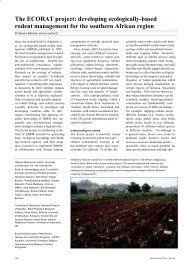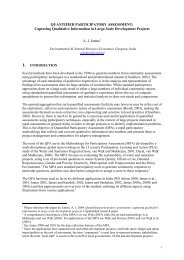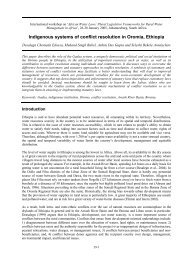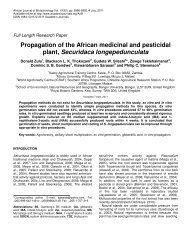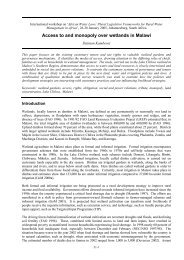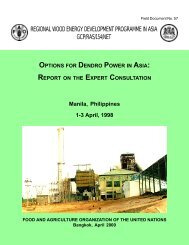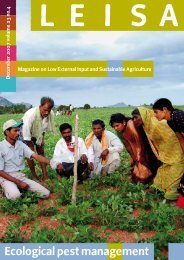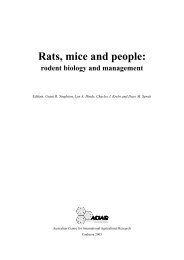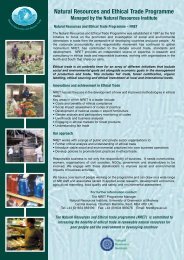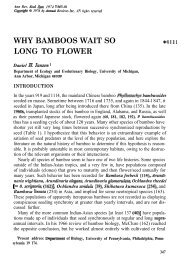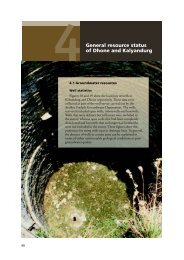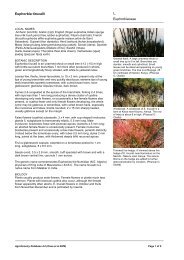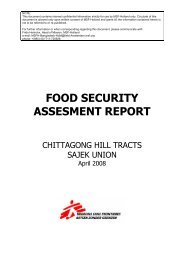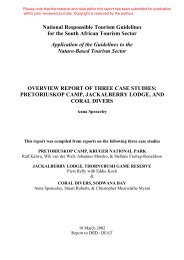Access to Rural Non-Farm Livelihoods - Natural Resources Institute
Access to Rural Non-Farm Livelihoods - Natural Resources Institute
Access to Rural Non-Farm Livelihoods - Natural Resources Institute
Create successful ePaper yourself
Turn your PDF publications into a flip-book with our unique Google optimized e-Paper software.
5.4 <strong>Farm</strong> and non-farm livelihoods<br />
Agriculture underpins the economy of the village and of almost every household, both rich<br />
and poor, with income coming primarily from the sale of food and cash crops as well as small<br />
lives<strong>to</strong>ck and cattle. One of the major crops for sale is ma<strong>to</strong>oke, which is harvested year<br />
round, evening out somewhat the seasonality of agricultural incomes, which are further<br />
complemented by the sale of small lives<strong>to</strong>ck. Paid farm labour is relatively common, and was<br />
reported by 29% of households interviewed, particularly those headed by women. However,<br />
not all could get all the work they would like as the well off people who use hired labour<br />
have access <strong>to</strong> very cheap labour from a nearby prison. Well off people with cattle also<br />
employ others <strong>to</strong> care for them.<br />
Just over half (53%) of households visited were involved in at least one non-farm IGA, and<br />
of those which were currently farming only, 43% had been involved in non-farm IGAs in the<br />
past, but had had <strong>to</strong> s<strong>to</strong>p as a result of old age or ill health 110 , or personal misfortune 111 . Most<br />
of the non-farm IGAs undertaken in the village are traditional in nature, and the older people<br />
interviewed have been undertaking them for 15 – 20 years. Informal observations indicate<br />
that those involved in less traditional IGAs have moved <strong>to</strong> the trading centre at Lwentulege<br />
(or elsewhere), which has developed very rapidly from almost nothing in the past few years.<br />
NGOs have had relatively little impact – the idea for the one group encountered came from<br />
the radio 112 – and few have had access <strong>to</strong> credit.<br />
Of the non-farm IGAs undertaken in Kitambuza, trading in agricultural produce and<br />
shopkeeping were reported <strong>to</strong> be the most profitable, and typically bring in more income than<br />
farming, while the other non-farm IGAs recorded tend <strong>to</strong> be low profit, low barrier activities<br />
which supplement basic farming incomes, often of households under stress 113 . In contrast <strong>to</strong><br />
Byakabanda 114 , a strong farming base was perceived as a very important prerequisite for<br />
entry in<strong>to</strong> a lucrative non-farm IGA 115 . However, most (64%) of those interviewed choose or<br />
would choose <strong>to</strong> invest any extra money in<strong>to</strong> trading, shopkeeping, or other retail<br />
activities 116 , with only 27% electing <strong>to</strong> invest in lives<strong>to</strong>ck or crop growing activities as a first<br />
priority. In reality, however, most lack sufficient capital <strong>to</strong> get started in these trading<br />
activities, and thus, when able, tend <strong>to</strong> invest the small amounts of capital they do have in<strong>to</strong><br />
rearing small lives<strong>to</strong>ck, which can be easily liquidated should the need arise. Three different<br />
female household heads interviewed aspired <strong>to</strong> non-farm IGAs because they found doing<br />
farm work on their own <strong>to</strong>o hard and <strong>to</strong>o tiring, or were unable <strong>to</strong> do it due <strong>to</strong> poor health 117 .<br />
Most of the non-farm IGAs recorded depend on adding value <strong>to</strong> primary production, or<br />
exploiting natural resources in some way, for example trading in agricultural produce,<br />
brewing local beers, or pottery and basket and mat weaving, while others are based on<br />
providing services.<br />
110 See Box 17.<br />
111 See Boxes 19 and 20.<br />
112 See Box 14.<br />
113 See Boxes 14, 15, and 16.<br />
114 See section 4.4.<br />
115 For example:<br />
“No one becomes rich without starting with a farm”<br />
Participant in the group meeting <strong>to</strong> define wealth/wellbeing groups and rank IGAs. 13/10/2000<br />
116 See Boxes 11, 13, 17 and 18.<br />
117 See Boxes 17, 20, and 21.<br />
56



